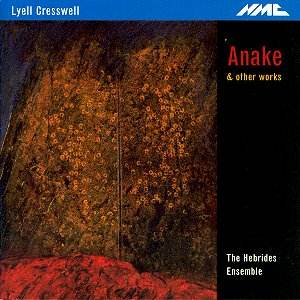So far, Lyell Cresswell may be better known for his
large-scale orchestral works including several substantial concertos,
such as his Cello Concerto or his accordion concerto Dragspil,
some of which have been available in commercial recordings (CONTINUUM
CCD 1033 review
and CCD 1034). However, these recordings seem to be no longer available
at the time of writing, so that the present release is the only one
so far devoted to Cresswell’s music. This generous CD is the more welcome
in that it consists entirely of chamber works, all but one for solo
instruments. It thus usefully complements the CONTINUUM CDs in providing
a well-planned survey of Cresswell’s recent chamber music. (All, with
the exception of the Variations on a Theme by Charles Ives,
were composed over the last ten years or so.)
Whira (Maori for "violin")
for solo violin was completed in 1996. This substantial work consists
of seven short contrasted sections, each exploiting either a technical
or expressive facet of the instrument without ever resorting to empty
virtuosity to make its point. According to the composer, sections 3
to 5 form a lighter middle section. (Section 5 Burla was written
as a tribute to the late Douglas Lilburn on his 80th birthday.)
Cresswell wrote Atta for solo cello in
1993 for the opening of an exhibition of the work of the Italian painter
Maurizio Bottarelli (a painting of his adequately adorns the cover of
this CD). As with the preceding work, Atta is in eight
short sections ("atta" is Old Norse for "eight"),
each one evoking some aspects of Bottarelli’s paintings through a different
approach of cello technique. The whole is another work of substance,
again eschewing virtuosity for its own sake. For Cresswell, expression
is of paramount importance and it is achieved by a huge variety of means
while avoiding any trendy "tricks and gimmicks".
Anake (1998), which gives the present
release its collective title ("anake" is Maori for "alone"),
is quite similar to the other pieces. Three short movements: the opening
section contrasts fragmentary ideas with slower melodic lines. The second
section is a type of Scherzo and the piece ends with a beautifully moving
lament inspired by a line from Frederico Garcia Lorca’s Llanto por
Ignacio Sanchez Mejias.
These three pieces called to mind, for the present
writer, Jolivet’s masterpieces for solo instruments such as Incantations
(flute), Ascèses (viola or clarinet) and
Suite Rhapsodique (solo violin), and I am glad to say
that they compare quite favourably with these wonderful pieces.
Acquerello, also dating from 1998, is
a beautifully evocative miniature for piano which should become highly
popular and which is ideally suited as an encore.
Cresswell recalls that, as a schoolboy, he was attracted
by Ives’ music, especially the "crazy mixture of hymn tunes, camp-meeting
songs, marching bands and so on". His Variations on a Theme
by Charles Ives for flute and cello, completed in 1987, are
based on Ives’ song Songs my Mother taught Me. The statement
of Ives’ simple tune is followed by twelve short, mainly nostalgic variations.
Cresswell quite rightly avoided any attempt at mimicking Ives’ music
so that the Variations sound as an affectionate and deeply-felt
tribute to the older composer.
This is a really superb release: wonderful music, of
great communicative power, in carefully and lovingly prepared performances
by dedicated players who all have the full measure of the music. I hope
that it will lead to more recordings of Cresswell’s well-crafted and
expressive music.
Hubert CULOT


